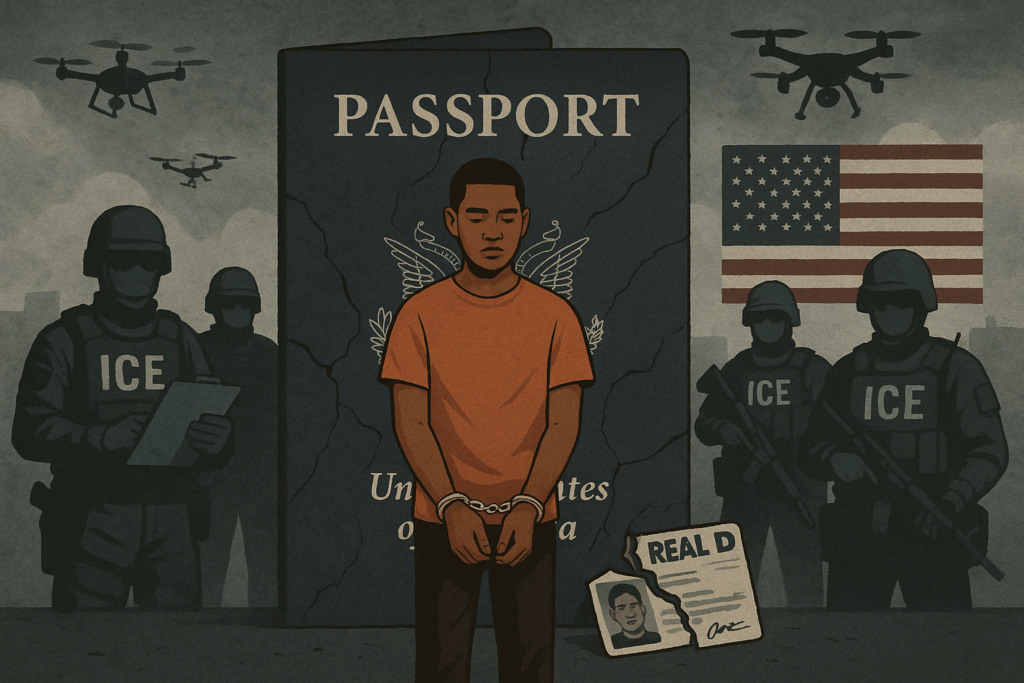 In May 2025, Leonardo Garcia Venegas—born in Florida, carrying a Real ID, fluent in English—was tackled, handcuffed, and detained by ICE agents in Alabama. His “crime”? Being brown in a room full of white ICE uniforms.
In May 2025, Leonardo Garcia Venegas—born in Florida, carrying a Real ID, fluent in English—was tackled, handcuffed, and detained by ICE agents in Alabama. His “crime”? Being brown in a room full of white ICE uniforms.
This wasn’t a mistake. It was a system working as designed.
Garcia Venegas wasn’t the first in 2025, and he won’t be the last. Since January, there have been at least five documented cases of U.S. citizens detained under suspicion of being “unauthorized aliens”—each time due to a mix of racial profiling, dismissive treatment of valid documents, and a legal structure that offers little to no recourse when civil rights are violated by federal enforcement.
This is what authoritarianism looks like in America.
ICE’s treatment of Garcia Venegas mirrors that of:
- Juan Carlos Lopez-Gomez, a Georgian born citizen arrested under Florida’s SB 4-C and detained despite showing a birth certificate.
- Jose Hermosillo, held ten days after being coerced into signing documents he couldn’t read.
- A Puerto Rican family in Milwaukee detained for the crime of speaking Spanish.
- Jensy Machado, handcuffed on his way to work, later told it was a “misunderstanding.”
In each case, the burden was on the citizen to prove their right to exist in their own country. And in each case, ICE failed upward—no agents disciplined, no officials held accountable, no meaningful public apology issued.
This is the cost of normalizing suspicion over evidence.
Trump’s second term has made one thing violently clear: civil rights are now conditional—on skin tone, language, ZIP code. Policies and state laws like Florida’s SB 4-C effectively allow any local cop or federal agent to turn due process into a guessing game. The standard for suspicion? Ethnicity. Accent. Where your grandparents were born.
Real ID compliance? Doesn’t matter.
Birth certificate? Ignored.
Social Security number? Accepted only after trauma.
The legal rot goes deeper.
The courts are complicit. In the name of “enforcement efficiency,” federal courts have shown deference to immigration authorities, even in blatant cases of wrongful detention. Qualified immunity remains a nearly unbreachable wall, shielding ICE from the consequences of violating citizens’ rights.
Congressional oversight? Performative at best. The same House committee that spent months screaming about the “border crisis” hasn’t held a single hearing on the wrongful detention of U.S. citizens this year.
This is not incompetence. It is intent.
Wrongful detention isn’t a bug in the system—it’s the point. It sows fear. It enforces submission. It tells entire communities: “Your citizenship is provisional. We decide when it counts.”
This kind of state behavior has historical precedent. Ask any Japanese-American family about the internment camps. Ask Black Americans about stop-and-frisk. Ask Muslim Americans about post-9/11 surveillance. This isn’t new—it’s just being digitized, automated, and armed.
So where is the outrage?
Too many Americans are willing to believe that a brown man detained by ICE probably did something. That a Puerto Rican family speaking Spanish in public must have invited suspicion. That these are unfortunate but understandable “errors” in a time of “crisis.”
That’s how rights erode. Not with mass revocations, but with silent exceptions. One “mistake” at a time, until the exceptions define the rule.
And if you think your skin color, passport, or polite accent will always protect you, history says otherwise. Once the machinery of suspicion is built, it will come for more than the people you don’t know.
Final thought:
There is no such thing as a minor civil rights violation when done by the state. Every wrongful detention is a test run. Every silence a signal. Every unpunished agent a message: you can do it again.
And they will.
Because right now, the state is betting you’ll accept it.

